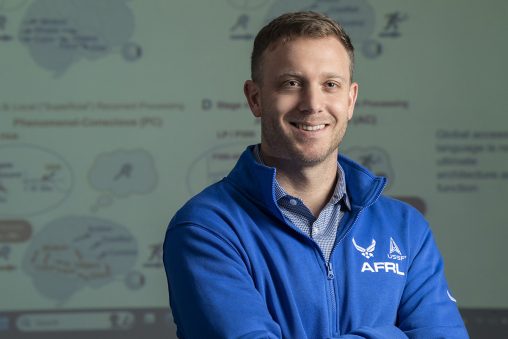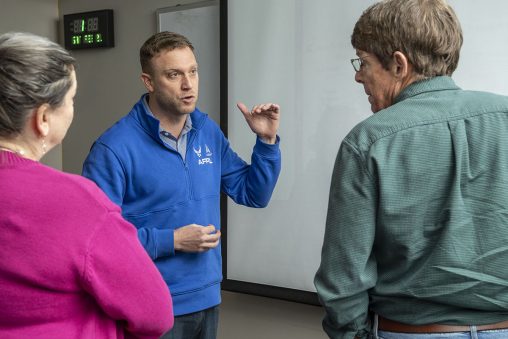
Wright State University alumnus Kevin Schmidt, now developing cutting-edge AI technologies for the Air Force Research Laboratory, credits his success to the mentorship and hands-on experiences he received during his behavioral neuroscience studies at his alma mater. (Photos by Erin Pence)
Artificial intelligence algorithms that fly F-16 fighter jets and autonomous systems delivering critical medical supplies in combat zones are among the cutting-edge technologies being developed by a Wright State University graduate whose journey began in Hamilton Hall.
Kevin Schmidt, Ph.D., now a senior neuroscientist on the Air Force Research Laboratory’s Autonomy Capability Team 3 based at Wright-Patterson Air Force Base, credits his success to the foundation built during his time at Wright State.
While pursuing his behavioral neuroscience degree at Wright State, Schmidt found more than just academic achievement — he discovered a supportive community and crucial mentorship that would shape his future.
He worked particularly closely with behavioral neuroscience professors Dragana Claflin, Ph.D., his honors thesis advisor, and Patricia Schiml, Ph.D., and Michael Hennessy, Ph.D. Schmidt also has fond memories of psychology professors Herbert Colle, Ph.D., and Martin Gooden, Ph.D.
“It is a blessing to have people like that in your life. They were good to me,” Schmidt said. “Now, I mentor others and enjoy it. I certainly appreciate those who did it for me.”
The hands-on research experiences at Wright State proved invaluable for Schmidt’s development. He recalled collaborating with Hennessy and Schiml on a study examining factors that reduce stress in sheltered dogs, one of his first formal research experiences.
These early experiences frequently come to mind when the 2011 graduate returned to Wright State to speak during a brown bag discussion series.
After earning his Wright State degree, Schmidt received a Science, Mathematics and Research for Transformation (SMART) fellowship to pursue a master’s degree from the Cognitive and Behavioral Neuroscience Program at George Mason University. He later earned a second SMART fellowship to complete a Ph.D. in cognitive neuroscience at Northwestern University.
Today, though stationed in New Haven, Connecticut, Schmidt maintains strong ties to the Dayton region through his work with AFRL and Wright-Patterson Air Force Base, keeping him connected to his alma mater.
His work sits at the intersection of artificial intelligence and human performance. As part of the Autonomy Capability Team 3 (ACT 3), considered the Air Force Research Lab’s premier artificial intelligence research team, Schmidt helps develop technologies that will define the future of both the Air Force and Space Force.
“There are tools that are needed and lives can be saved right now,” he said. “The big thrust now is how these AI tools can assist medical decision making and logistics. But there is also a longer-term aspect of these tools that we are envisioning for the next generation of AI. There is certainly a great deal to delve into right now.”

Alum Kevin Schmidt was invited back to Wright State to give a talk at the Department of Psychology’s brown bag lecture series during the spring semester.
Through Autonomous Air Combat Operations, ACT3 develops algorithms that control F-16 aircraft autonomously. ACT3 also oversees a space program that integrates measures of human performance. Another critical project involves autonomous aerial refueling, delivering fuel at the right time and location.
“The same algorithms that are used for aerial refueling can be used for medical resupply. So, it comes down to developing algorithms that scale across mission areas,” he said.
When Schmidt gets a break from the lab, he is an avid rock and mountain climber, an interest first kindled during his time at Wright State.
“I grew up in Cincinnati doing it here and there, and then Wright State has a rock-climbing wall. I really got into it there,” Schmidt said. “I started visiting Red River Gorge in Kentucky, and it was a natural evolution into mountain and glacier-style climbing. My interest has just continued to grow through the years.”
As Schmidt continues to push boundaries in both his professional work and personal adventures, he remains deeply connected to the institution that helped launch his career.
“I go the extra mile for Wright State because I am thankful for the people there and my experience,” he said. “That is where my career started.”

 Adventures await
Adventures await  Wright State to expand nursing facilities to meet workforce needs and prepare more graduates for in-demand careers
Wright State to expand nursing facilities to meet workforce needs and prepare more graduates for in-demand careers  Wright State student-athletes make a lasting impact on local family with more to come
Wright State student-athletes make a lasting impact on local family with more to come  Wright State names Rajneesh Suri dean of Raj Soin College of Business
Wright State names Rajneesh Suri dean of Raj Soin College of Business  ‘Only in New York,’ born at Wright State
‘Only in New York,’ born at Wright State 